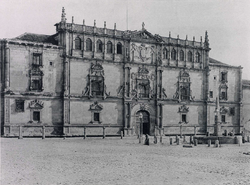Universidad de Alcalá de Henares
| Universidad de Alcalá | |
 |
|
| Type | public |
|---|---|
| Established | 1293 |
| Endowment | 160 million EUR |
| Rector | Dr. Fernando Galván |
| Students | 22,836 |
| Location | Alcalá de Henares, Madrid, Spain |
| Campus | Urban and Outskirts |
| Faculty | 1,616 |
| Colors | |
| Nickname | UAH |
| Affiliations | Campus Europae, |
| Website | www.uah.es |
 |
|
The University of Alcalá (Spanish: Universidad de Alcalá) is a public university located in Alcalá de Henares, a city 35 km (22 miles) northeast of Madrid in Spain and also the third-largest city of the region. It was founded in 1293 as a General Studio for the public, and was refounded in 1977. The University of Alcalá is especially renowned in the Spanish-speaking world for its annual presentation of the highly prestigious Cervantes Prize. The University currently enrolls 28,336 students, 17,252 of whom are studying undergraduate degrees which are taught by a teaching staff of 2,608 professors, lecturers and researchers belonging to 24 departments. The University is also proud of its modern and efficient administration, which is carried out by the Administration and Services, comprising approximately 800 people.
One of the university's campuses, located in the city center, is housed partly in historic buildings which were once used by the Complutense University of Madrid, which was located in Alcalá from its mediaeval origins until it was moved to Madrid in 1836.
By a royal order of 29 October 1836, Queen Regent Maria Christina ordered The University to move to Madrid, where they took the name of Literary University and, in 1851, the Central University of Madrid. The University would be known under this name until its original name of "Complutense" was restored in the 1970s.
In 1975, after years of the buildings passing between various businesses, Complutense University opened its Alcalá branch as a means to decongest its growing student population. In 1977, the university was re-founded as "the University of Alcalá de Henares," which later was shortened to "the University of Alcalá" in 1996. In 1998 Unesco named it a World Heritage site.
Today's University of Alcalá preserves its traditional humanities faculties, a testimony to the university's special efforts, past and present, to promote and diffuse the Spanish language through both its studies and the Cervantes Prize, which is awarded annually by the King and Queen of Spain in the elegant sixteenth-century Paraninfo (Great Hall). The University has added to its time-honoured education in the humanities and social sciences new degree subjects in scientific fields such as health sciences or engineering, spread out across its different sites (the Alcalá Campus, the Science and Technology Campus and Guadalajara), all of which, together with the Science and Technology Park, are a key factor in its projection abroad, while also acting as a dynamo for activities in its local region.
...
Wikipedia
